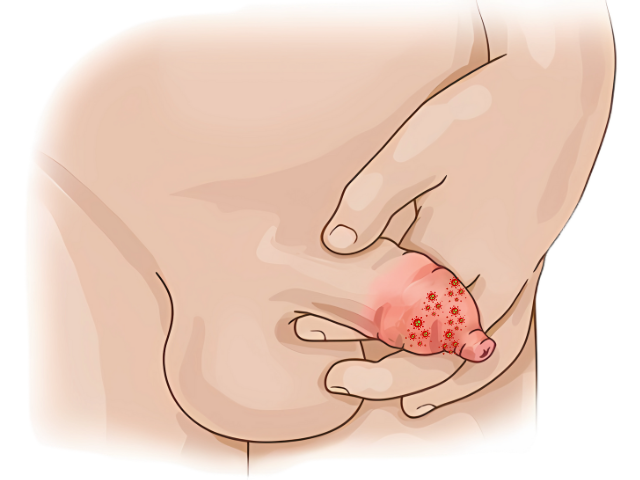Foreskin infection, also known as posthitis, is a common condition affecting uncircumcised men, leading to inflammation, pain, redness, and irritation in the foreskin. It is often associated with balanitis (inflammation of the penis head) and, if left untreated, can cause severe discomfort and complications.
At KK Virat Hospital, Karimnagar, we provide expert diagnosis, medical management, and advanced surgical treatments to help patients manage and recover from foreskin infections effectively.
What Is Foreskin Infection (Posthitis)?
Foreskin infection occurs due to bacterial or fungal growth, resulting in inflammation of the prepuce (foreskin). While posthitis is not classified as a sexually transmitted disease (STD), ignoring symptoms or delaying treatment can lead to recurrent infections, scarring, and difficulty retracting the foreskin.
This condition is commonly seen in men who have poor hygiene, uncontrolled diabetes, or pre-existing conditions like phimosis (tight foreskin).

Causes of Foreskin Infection
Several factors contribute to the development of foreskin infection, including:
- Bacterial or Fungal Infections – Overgrowth of harmful microorganisms under the foreskin
- Poor Genital Hygiene – Lack of regular cleaning leads to accumulation of bacteria and smegma
- Uncontrolled Diabetes – High blood sugar levels increase the risk of infections
- Phimosis or Paraphimosis – Tight foreskin trapping moisture and bacteria
- Sexually Transmitted Infections (STIs) – Certain infections may cause inflammation
- Excessive Friction or Rubbing – Irritation due to aggressive handling or masturbation
Men who do not clean their foreskin regularly or have a sensitive prepuce are at a higher risk of developing recurrent foreskin infections.
Symptoms of Foreskin Infection
Foreskin infections often present with noticeable signs, which may worsen over time if left untreated.
- Redness and swelling of the foreskin
- Pain and irritation around the penis
- Foul-smelling discharge from under the foreskin
- Itching or burning sensation
- Difficulty retracting the foreskin (in cases of phimosis)
- Bleeding or ulcers (in severe cases)
If you notice any of these symptoms, seeking medical attention promptly is crucial to prevent complications.
Diagnosis of Foreskin Infection
At KK Virat Hospital, Karimnagar, our specialists diagnose foreskin infections through:
- Physical Examination – Doctors examine the foreskin for inflammation, redness, and swelling.
- Swab Test – A sample is taken from the affected area to identify bacterial or fungal infections.
- Urine Test – This test rules out diabetes and other underlying health issues.
In most cases, a detailed discussion of symptoms and medical history helps doctors determine the cause and severity of the infection.
When Should You See a Doctor?
Although minor foreskin infections may subside within a week, medical consultation is necessary if:
- Symptoms persist for more than seven days
- The infection recurs frequently
- You notice bleeding, pus, or foul-smelling discharge
- The pain and swelling worsen despite home care
Ignoring foreskin infections can lead to chronic balanitis, painful urination, and difficulty with sexual activity.
Treatment Options for Foreskin Infection
Medical Management (Non-Surgical Treatment)
For mild to moderate foreskin infections, doctors may recommend:
- Antibiotic or Antifungal Medications – To control bacterial and fungal infections
- Hygiene Practices – Regular cleaning of the foreskin with warm water
- Pain Relievers & Anti-Inflammatory Creams – To reduce discomfort and swelling
However, for recurrent or severe infections, surgical intervention may be required.
Surgical Treatment – Circumcision
Circumcision is a permanent solution for recurrent foreskin infections, phimosis, and chronic balanitis. It involves the removal of the foreskin and can be performed using different techniques:
Types of Circumcision Surgery:
- Laser Circumcision – Minimally invasive, no stitches, quick healing, and minimal bleeding
- Stapler Circumcision – Uses a medical stapler for precision and faster recovery
- Conventional (Open) Circumcision – Traditional surgical method involving scalpels and sutures
Post-Surgery Care & Recovery Tips
After circumcision surgery, proper post-operative care is essential for faster recovery and prevention of complications.
- Start walking within a day or two, but avoid heavy activities
- Take prescribed pain relievers to manage discomfort
- Do not shower until the bandage is removed
- Keep the surgical site clean and dry
- Avoid using soaps, creams, or gels on the area
- Follow doctor’s instructions for dressing changes
Most patients recover within 7-10 days and can resume normal activities soon after.
Potential Risks of Surgery
While circumcision is a safe procedure, some potential risks include:
- Bleeding from the incision site (rare but possible)
- Infections may occur if post-surgery hygiene is not maintained
- Delayed wound healing or minor scarring
- Foreskin-related issues due to improper surgery
- Allergic reaction to anesthesia
Why Choose KK Virat Hospital for Foreskin Infections Treatment?
At KK Virat Hospital, Karimnagar, we offer expert care for foreskin infections, phimosis, and circumcision using advanced surgical techniques. Our highly skilled urologists ensure safe, effective, and minimally invasive treatments with fast recovery.
- Expert Urologists: Our team consists of top urologists specializing in treating Paraphimosis conditions.
- Advanced Laser & Stapler Circumcision: We use the latest methods like laser and stapler circumcision for safe and effective treatment.
- High Success Rates with quick recovery
- Personalized Treatment Plans – We offer tailored treatment based on individual patient needs.
- Affordable & Insurance-Covered Treatments – We ensure cost-effective solutions with insurance assistance.
Your Health, Our Priority – Book Your Consultation Today!
If you’re struggling with foreskin infections, phimosis, balanitis, or need circumcision, don’t delay seeking treatment. At KK Virat Hospital, Karimnagar, we ensure safe, advanced, and confidential care tailored to your needs.
- Call Us Directly: Get in touch with our medical coordinators to schedule an appointment with an expert urologist.
- Direct Visit: You can visit our hospital directly by carrying your previous medical records if you have a medical history. However, admission will be based on the doctor’s recommendation.
Is Posthitis Contagious? Can It Spread to My Partner?
Posthitis itself is not contagious, but if caused by a fungal or bacterial infection, it may spread through direct contact. Proper hygiene and treatment are essential.
Is Posthitis Curable? Best Treatments & Prevention Tips
Yes, posthitis is completely curable with antifungal, antibacterial, or anti-inflammatory treatments based on its cause. Circumcision may be an option for recurrent cases.
Can I Have Sex If I Have Foreskin Infection or Posthitis?
It’s best to avoid sexual activity until the infection heals, as irritation can worsen symptoms and, in some cases, infect a partner if the cause is fungal or bacterial.
How Painful Is Foreskin Infection? Understanding the Symptoms
The pain level varies; mild infections cause itching or redness, while severe cases can lead to burning, swelling, and difficulty retracting the foreskin.
Can Foreskin Infection Cause Pimples on the Penis?
Yes, posthitis or balanitis can cause small bumps or pus-filled pimples, especially if related to bacterial infections, poor hygiene, or STDs.
Can Foreskin Infection Cause White Patches on the Penis?
Yes, white patches can appear due to yeast infections, lichen sclerosus, or fungal overgrowth. Proper diagnosis is needed for targeted treatment.
Why Does My Penis Tip Hurt When I Touch It? Causes & Solutions
Pain at the tip of the penis could be due to posthitis, balanitis, UTIs, or nerve sensitivity. Identifying the root cause helps determine treatment.
How to Tell If Balanitis Is Fungal or Bacterial? Key Differences
Fungal balanitis (caused by yeast) presents with redness, itching, and white discharge, while bacterial balanitis may involve pain, foul odor, and pus.
What Happens If You Ignore a Foreskin Infection? Risks & Complications
Untreated infections can lead to chronic inflammation, scarring, phimosis (tight foreskin), or increased risk of STDs. Seek treatment early.
What Is the Fastest Way to Treat Foreskin Infection?
Proper hygiene, prescribed antifungal/antibacterial creams, and avoiding irritants help cure infections quickly. Severe cases may need circumcision.


